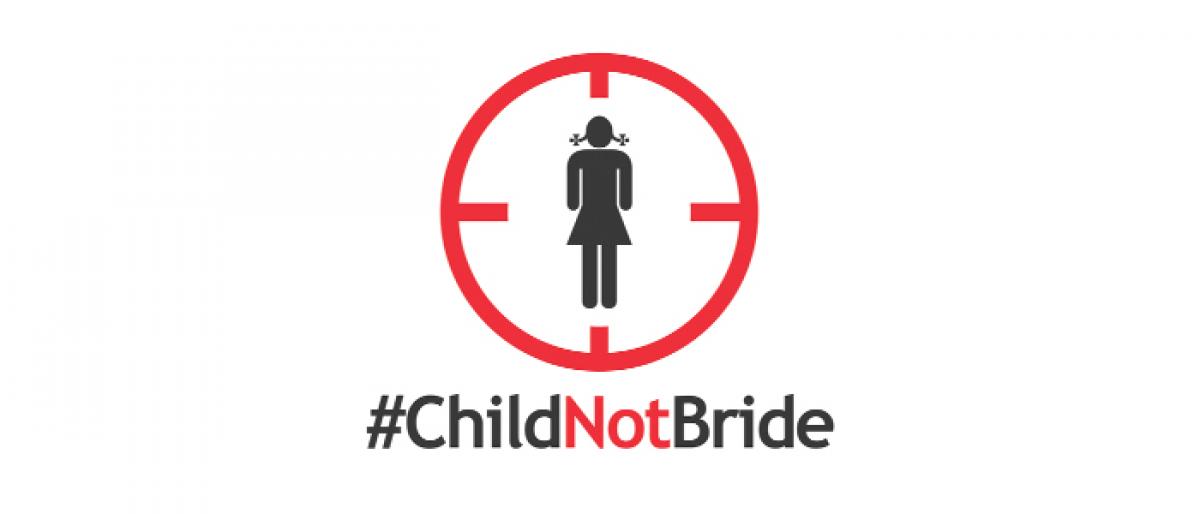Live
- The Countdown Begins: Ramayana: The Legend of Prince Rama Trailer Out Now
- AP to Attract ₹10 Lakh Cr Investment in Green Energy; Chandrababu
- Shiva, Sachin enter quarterfinals of men’s Boxing Nationals
- Clop lacks context, says DIG after video on conception lecture to schoolgirls goes viral
- Kolkata Police investigate Bengal-based NRIs abroad with fake Indian passports
- Chandrababu extends Sankranti greetings to Telugu people
- Piyush Goyal urges cleantech sector to go for self-sustaining innovations
- Yogi flags off 100 new buses for Mahakumbh devotees
- Yemen's Houthis to 'pay heavy price' for attacking Israel, warns Netanyahu
- Yogi inaugurates UP Darshan Mandapam
Just In

As a 15yearold, she convinced her parents not to marry her off so she could fulfill a childhood dream of becoming a doctor and treating the poor Now, two years later, Priyanka Bauri strives to make other girls and their parents conscious of the perils of child marriage
As a 15-year-old, she convinced her parents not to marry her off so she could fulfill a childhood dream of becoming a doctor and treating the poor. Now, two years later, Priyanka Bauri strives to make other girls and their parents conscious of the perils of child marriage.
"I had stopped my own marriage by convincing my parents that I want to study and become a doctor. I would like to treat the downtrodden and neglected people. I told my mother that marrying early and conceiving early can be detrimental to our health," Bauri, now 17, confidently told a group of visiting journalists at Purulia.
Bauri, a resident of Neturia block in Parbatput village of West Bengal's backward Purulia district, said her parents wanted her to get married at the age of 15 to fight against poverty. She made them understand that she wanted to study, which would enable her to look after the needs of the family.
"Now I make other girls understand," Bauri said.
She is not alone. Other brave girls, aided by UNICEF, have fought off marital atrocities to return to the world of books and lead by example in Purulia, where almost 38.3 percent of young females get married before the age of 18.
The female literacy rate in the district is an abysmal 50.52 percent, a figure much lower than the state average of 70.54 percent.
Nabami Besra and Renuka Majhi from the interiors of Purulia were forced to quit their studies and marry at tender ages. But neither of them tolerated the misbehaviour of their in-laws. They are now back with their parents and studying further.
"I want to be independent and join the police force," said Besra.
UNICEF, with the support of the district administration, initiated the Adolescent Empowerment Program (AEP) to carry out various activities in 10 blocks and three municipalities of Purulia in 2015. These programmes include empowerment through life skill education, promoting sports and self-defence, et al.
"I am amazed to see the awareness level among young girls in Purulia. The National Family Health Survey (NFHS)-4 of the year 2015-16, shows the rate of child marriage in Purulia as 38.3 percent, but I am sure the present data will show a decline as various government schemes are being implemented very effectively," said Mohammad Mohiuddin, chief of UNICEF'S West Bengal unit.
Talking about proper execution of existing government policies, Swapnadeepa Biswas, Child Protection Officer, UNICEF, said: "There are lots of empowerment programmes, but what was needed was a holistic approach that took into account all factors -- health, nutrition awareness, the safety of oneself, education, earning a livelihood and maintaining of hygiene."
"There are initiatives for both boys and girls, but girls are given a little more support due to their social conditions," Biswas added. For instance, the Kanyashree Football Tournament (KFT) initiated in 2015 helped in mobilising 5,400 Kanyashree girls from 183 Clubs.
"Through our Kanyashree Swabalambi project (Kanyashree self-dependence project) inaugurated in July 2017, we are providing training in tailoring, nursing, handicrafts, etc. We are coming up with buildings in each block headquarters named 'Kanyashree' where there will be books, computers with high-speed internet -- and a training centre for vocational skills," District Magistrate Alokesh Prasad Roy said.
There will be dormitories for the ones who want to stay back if they get late, Roy added.
Kanyashree is a flagship scheme of West Bengal's Mamata Banerjee government aimed at improving the life and status of girls.

© 2025 Hyderabad Media House Limited/The Hans India. All rights reserved. Powered by hocalwire.com







